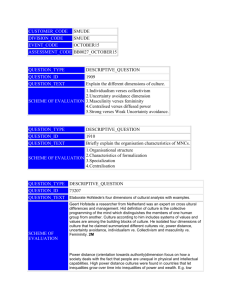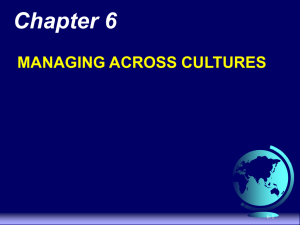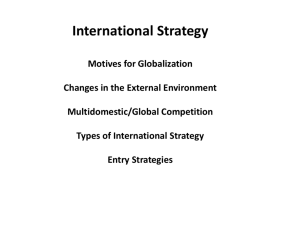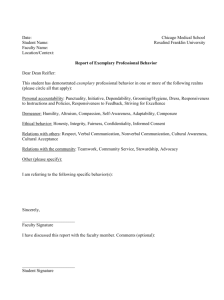Global Issues in Management - FacStaff Home Page for CBU
advertisement
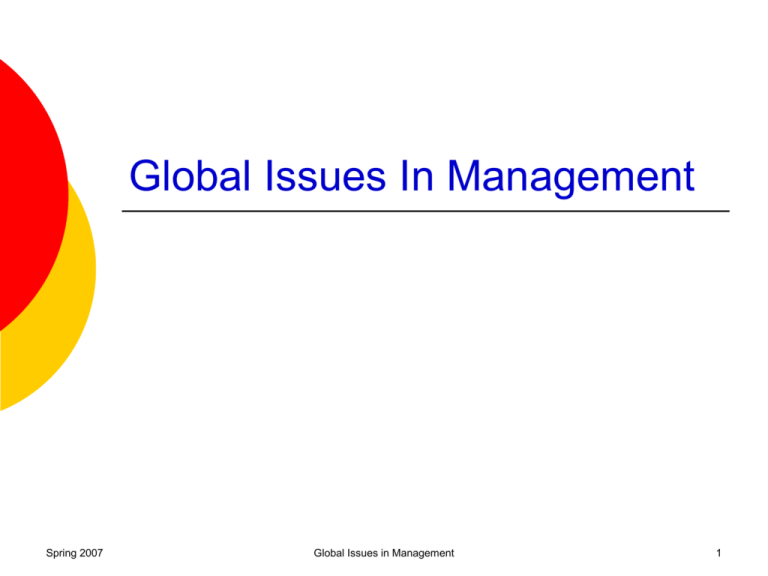
Global Issues In Management Spring 2007 Global Issues in Management 1 Global Issues in Management • A more complex external environment • Legal and political factors • Economic factors • Cultural differences Spring 2007 Global Issues in Management 2 Why Globalize? • New markets • CocaCola • Disney • More sources for innovative ideas • Demand for global services • FedEx • Netscape • Keep up with competition • Low cost manufacturing • Low cost…but what about productivity • Ethical issues Spring 2007 Global Issues in Management 3 Profiting from Global Expansion • International firms can: • Earn a greater return from distinctive skills or core competencies • Realize location efficiencies by dispersing operations to locations where they can be performed most efficiently • Realize economies of scale • Realize economies of scope • Worldwide learning • Multimarket flexibility Spring 2007 Global Issues in Management 4 What Makes Globalization Possible? • Technology • Transportation • Communications • • • • Spring 2007 Open markets Economic integration Peace Corporate strategy Global Issues in Management 5 Approaches to International Business Geocentric Use the best methods, no matter what the source Ethnocentric Home country methods are the best Spring 2007 Polycentric Host country methods are the best Global Issues in Management 6 Borders • Economic, political and cultural factors may apply to regions, not just countries • These factors may also vary within countries (Belgium, Canada, for example) • But, important to know the map Spring 2007 Global Issues in Management 7 The International Environment: Economic • Differing levels of economic development • Infrastructure (or lack thereof…) • Transportation • Energy • Communications • Resources and markets • Availability of raw materials • Untapped markets • Exchange rates, taxes, inflation • Growing trend towards market economies Spring 2007 Global Issues in Management 8 Economic Systems • Market Economy • Private ownership • Supply and demand • Command Economy • Centralized ownership • Planned production • Mixed Economy • Some public ownership in national interest: health care, communications • State Directed Economy • Government oversight and coordination of economic activities • State subsidies Spring 2007 Global Issues in Management 9 The International Environment: Political • Treaties and alliances • NAFTA • European Union • Political risk and instability • • • • War and / or revolution Terrorists, kidnapping and riots Nationalization An opportunity? Eastern Europe • Laws and regulations Spring 2007 Global Issues in Management 10 North American Free Trade Agreement • Became law: January 1,1994 • Over 15 year period: • tariffs reduced (99% of goods traded) • NTBs reduced • investment opportunities increased • Protects intellectual property • Applies national environmental standards Spring 2007 Global Issues in Management 11 Cultural Differences • Issues to get in trouble with… • Language • Religion • Languages to speak • Cultural differences • Business practices and etiquette Spring 2007 Global Issues in Management 12 Language Issues • U.S. one of few countries where we don’t learn a second (or a third) language • Languages learned in school often do not translate to business usage • Do you try? • Not in France, not unless you can pronounce it right ! • Other countries, yes: it’s a gesture of goodwill • But, even if the language is the same, will we understand? Spring 2007 Global Issues in Management 13 Sources:http://www.EdwardMooney.com/miniflags/; http://www.infoplease.com/ipa/A0774735.html Millions of Speakers Languages of the World 1,000 900 800 700 600 500 400 300 200 100 0 i li h h d a s s se ese ian an Wu ese ean nch n i i i g l e s n m e( n g H gu n n d r s a or Fre e n a a n e u p s K E B a G ne S R tu ap av r M J J i h Po C in ar Spring 2007 Global Issues in Management 14 Religious Issues • Islam: • Ramadan fasting • 5 daily prayers (15 minutes or so), even at work • Modest dress for women (including head scarf) • Friday, not Sunday (noon prayers on Fridays) Spring 2007 Global Issues in Management 15 Dress • “Casual Days” are a U.S. custom • Very conservative dress for women in Islamic countries • Removing one’s shoes • Across Asia • Russian homes Spring 2007 Global Issues in Management 16 Addressing Other People • Formality • Herr und Frau, not first names in Germany; U.S. is almost alone in using first names • Titles (Dr., Professor, “Assistant Vice President”, etc.) very important everywhere but U.S. • Be careful, if you know language, with formal and informal pronouns • Business cards essential in Mexico, Europe, Japan • Personal space: much smaller in Latin America, Spain, Italy Spring 2007 Global Issues in Management 17 Cultural Dimensions (Hofstede) • These are very important to understand • The dimensions: • • • • Spring 2007 Collectivism - Individualism Power Distance Uncertainty Avoidance Quality of Life Global Issues in Management 18 Collectivism - Individualism • Identification with group vs. identification as an individual • Collective cultures: • Think in terms of in-groups and out-groups • Life decisions made by group • Look after one’s in-group, no matter what • Individualistic cultures • Concern for self and immediate family • Individual privacy • Association with level of economic development Spring 2007 Global Issues in Management 19 Power Distance • The extent to which a culture accepts that power is distributed unevenly • High power distance • People have a place in society, high or low • Superiors are to be respected • Less trust and cooperation; more likelihood of corruption • Low power distance • Equal rights for everyone • Hierarchies are established for convenience • Power can be judged to be legitimate or not Spring 2007 Global Issues in Management 20 Uncertainty Avoidance • The extent to which a society feels threatened by ambiguity and uncertainty • High uncertainty avoidance • • • • Lots of policies, rules, regulations Hard work valued, time is money Acceptance of authority Conflict avoided • Low uncertainty avoidance • Look to common sense • Tolerance, constructive conflict • Aggression less accepted Spring 2007 Global Issues in Management 21 Quality of Life • • The extent to which society values typically “masculine” values, such as assertiveness, and acquisition of things, as opposed to caring for others and quality of life. Masculine cultures • • • • • Clear gender roles Live to work Ambition, success valued Machismo Feminine cultures • Sympathy for the unfortunate • Work to live • People are important Spring 2007 Global Issues in Management 22 A Fifth Dimension • Confucian Work Dynamic • Based on work done in East Asia by “Chinese Cultural Connection” group • Focus on: • • • • • Spring 2007 Long-term Order Thrift Persistence Respect for tradition Global Issues in Management 23 Stages in Going International Stage 1 Export to Foreign Countries Stage 2 Hire Foreign Agents / Brokers Contract Foreign Managers Stage 3 Licensing or Franchising Joint Ventures - Foreign Subsidiary Spring 2007 Global Issues in Management 24 Firms Face Two Conflicting Pressures Overseas Reduce costs Respond to local needs Spring 2007 Global Issues in Management 25 Local Responsiveness • Different consumer tastes and preferences • MTV – cricket in India • Ben & Jerry’s – ice cream in Japan • Whirlpool – the World Washer in India • Different infrastructure and practice • Left hand vs. right hand drive cars • Cup holders • Differences in distribution channels • Pharmaceuticals • Pillsbury – flour in India • Government demands • Local content rules Spring 2007 Global Issues in Management 26 Four Basic Strategies High Cost and efficiency pressures Low Low Spring 2007 Global Strategy Transnational Strategy Home Replication Strategy Multi domestic Strategy High Pressures for local responsiveness Global Issues in Management 27 Home Replication Strategy • Go where locals don’t have your skills • Little adaptation. Products developed at home (centralization) • Possibly a commodity item • Manufacturing and marketing in each location • Makes sense where low skills, competition, and costs exist Spring 2007 Global Issues in Management 12-17 28 Microsoft • • • • • • • • • • • • • • • • • • Argentina Australia Austria Belgium Bolivia Brazil Bulgaria Canada Chile China Colombia Costa Rica Cote D'Ivoire Croatia Czech Republic Denmark Dominican Republic Ecuador Spring 2007 • • • • • • • • • • • • • • • • • • • Egypt El Salvador Finland France Germany Greece Guatemala Hong Kong Hungary India Indonesia Ireland Israel Italy Jamaica Mexico Japan Jordan Kenya • • • • • • • • • • • • • • • • • • • • • Korea Kuwait Latvia Lebanon Luxembourg Malaysia Mauritius Morocco Namibia Netherlands New Zealand Nigeria Norway Pakistan Panama Peru Philippines Poland Portugal Puerto Rico Romania • • • • • • • • • • • • • • • • • • • Russia Saudi Arabia Singapore Slovakia Slovenia South Africa Spain Sweden Switzerland Taiwan Thailand Tunisia Turkey Ukraine United Arab Emirates United Kingdom Uruguay Venezuela Vietnam 31.4% of revenue outside U.S Global Issues in Management 29 Not always the best strategy, though 10% 1% 30% 31% 4% 24% North America Europe Spring 2007 Africa Latin America Asia Corporate Global Issues in Management 30 Multi-Domestic Strategy • Maximize local responsiveness • Customize the product and marketing strategy to national demands • Extremely decentralized • Often the strategy of choice for consumer products • Good for high local responsiveness and low cost reduction pressures • Nestle: • No indication of any pet food in Paraguay • Major brand in Chile • 6 pet food brands in U.S. Spring 2007 Global Issues in Management 12-18 31 Global Strategy • Best use of economies of scale and scope • This is a low cost strategy • Utilize product standardization to create a global product • Not good where local responsiveness demand is high Spring 2007 Global Issues in Management 32 Transnational Strategy • Core competencies can develop in any of the firm’s worldwide operations • Flow of skills and product offerings occurs throughout the firm - not only from home firm to foreign subsidiary (global learning) • Makes sense where there is pressure for both cost reduction and local responsiveness • But….costs involved in communication and coordination Spring 2007 Global Issues in Management 33



